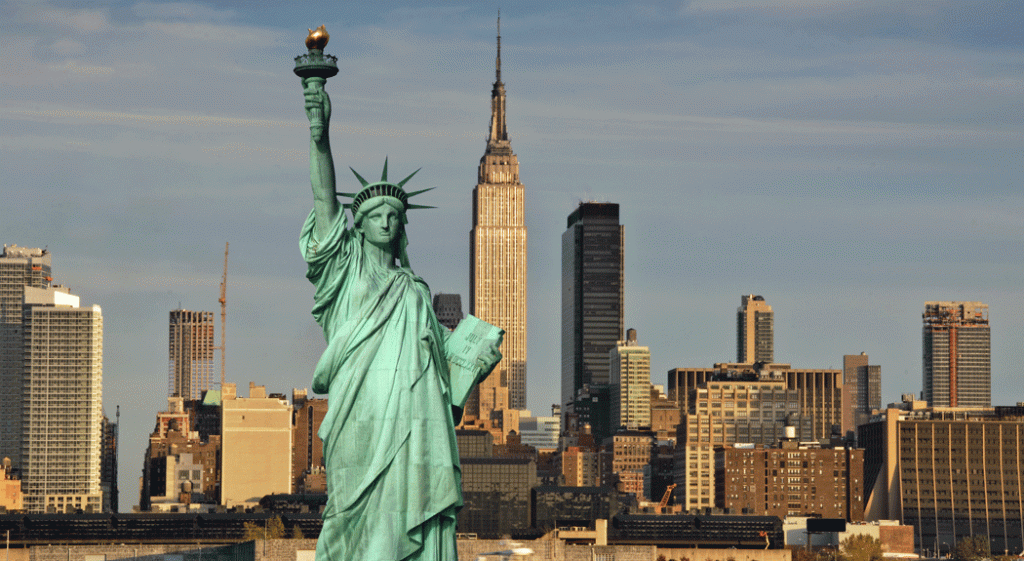Emma Lazarus and American Exceptionalism: Picks of the Week
Statue of Liberty Caught in White House Immigration Row | BBC
Trump Advisor Stephen Miller Undermines Poem’s Connection to Statue of Liberty | NPR
New York Today: The Politics in Poetry | The New York Times
The stories we tell ourselves shape the way we think about ourselves—read any self-help book and you know that “self-talk,” is a common refrain. When you tell stories about yourself where you are always the victim or always the hero, you are conditioning yourself to respond to other situations in that self-selected role. The same is true of the stories we tell about the United States.
One of the dominant narratives in the American psyche is that we are a nation of immigrants. It’s a story that happens to be supported by facts. With the exception of Native Americans, we all trace our roots to another land. Our ancestors braved harrowing ocean transits—some by choice and some in slavery—to come to the New World. Over the long arc of history, our society has blended these identities together to form an American identity. When I was in grade school, the term du jour was “the melting pot.” Now, people talk about America as a tossed salad—everyone preserving their own unique flavor, but we’re in the bowl together.
The poet Emma Lazarus contributed to this story about America with her poem “The New Colossus,” written in the late 1800s and sold to raise money for the pedestal on which the Statue of Liberty stands in New York Harbor.
Not like the brazen giant of Greek frame,
With conquering limbs astride from land to land;
Here at our sea-washed, sunset gates shall stand
A mighty woman with a torch, whose flame
Is the imprisoned lightening, and her name
Mother of Exiles. From her beacon-hand
Glows world-wide welcome; her mild eyes command
The air-bridged harbor that twin cities frame.
“Keep, ancient lands, your storied pomp!” cries she
With silent lips. “Give me your tired, your poor,
Your huddled masses yearning to breathe free,
The wretched refuse of your teeming shore.
Send these, the homeless, tempest-tost to me,
I lift my lamp beside the golden door!”
The poem was the central point in a heated exchange in the White House briefing room this week between Stephen Miller, a senior policy advisor to President Donald Trump, and CNN journalist Jim Acosta. Acosta read the most famous passage of the Lazarus poem—“Give me your tired, your poor, Your huddled masses yearning to breathe free”—to challenge the administration’s embrace of a legislative proposal to restrict U.S. immigration to skilled workers who speak English. Miller dismissed Acosta’s question by noting that the poem was not part of the Statue of Liberty and had only been added later. The colossus, Miller argued, was intended only to celebrate the light of liberty, not the opportunity created by migration to the United States. In other words, he was trying to change the narrative—undermining the story we have told ourselves for decades about America as a “melting pot.” If you prefer the “tossed salad” metaphor better, he’s saying immigration should be about “better ingredients.”
Our national motto, e pluribus unum, “from many, one,” originally intended to reflect several states forming one nation, has, in more recent generations, also been seen to describe one people—the American people—emerging from immigrants from all over the world. One of the reasons the American experiment has been so successful is because we have been able to assimilate and integrate different groups into our society. If you go to Europe, in contrast, and talk to people about what it means to be French or German, very quickly you learn that national identity is based purely on the blood in your veins. But in the American tradition—and the American myth—if you adopt our values and embrace our constitution, anyone can be American—with all the opportunities and potential that entails beyond “the golden door.” Anyone, we believe, can choose to be American—and that is perhaps one of our most exceptional features as a people and as a nation. In contrast, you cannot choose to be German, even if you live there.
To be sure, the “melting pot,” is a myth, too. We have always had grave societal challenges integrating others into the American nation. Generations have had to work to overcome stigma and suspicion, whether we’re talking about my Irish ancestors, or Islamic immigrants today. But if you go back and look at the founding documents of the American republic, the rhetoric supports a radical equality among people. It is appropriate, then, that the narrative to emerge from the immigrant experience of the 20th century is one that seems organic to our national experience. The truth is, nearly 20 million immigrants—including my Italian grandfather—entered the United States between 1890 and 1920 alone. Many were poor. Many worked as unskilled laborers upon arriving in the New World. Many spoke little or no English. They saw the Statue of Liberty as a welcoming symbol and the beginning of their American dream. They and their children would go on to win two world wars, the space race, and the Cold War. They built America’s middle class. They changed the world.
The power of the American myth is wrapped up in a colossus standing at the mouth of New York harbor, lifting her light as a beacon of hope to all those who seek shelter. “Mother of Exiles” is what Lazarus called the statue, rejecting the “storied pomp” of ancient lands, and welcoming “the homeless,” and “tempest-tost.” Don’t send us your best, Lazarus was saying, send us those who will most appreciate liberty, opportunity, and plenty.
That’s a story we should never stop telling ourselves. – Executive Director Jim Ludes

